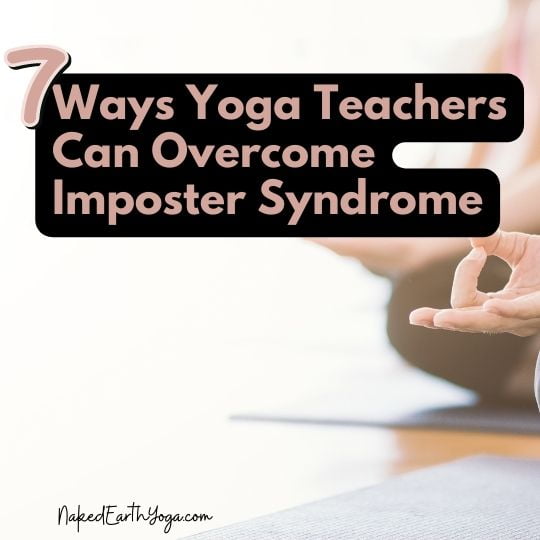Ugh. Let’s talk yoga teacher imposter syndrome.
I remember my first day teaching a yoga class like it was yesterday. I was so nervous.
The night before my first class, I could hardly sleep. On the drive to the studio, I had worrisome thoughts: “what if the students can see through me?”
“What if they can tell I have no clue about what I’m doing.” What if I really don’t have a clue what I’m doing!
Despite my yoga experience, having completed a yoga teacher training program, and my past years of experience teaching at a university, I doubted my ability to teach yoga. I was plagued with self-doubt. To say I was having doubts about the whole yoga teaching business was an understatement.
But it turns out I wasn’t alone in these feelings. And there’s a name for this nearly paralyzing form of self-doubt: imposter syndrome.
Sound relatable? Want to know more?
Well, let’s dive into imposter syndrome.
And let’s explore ways to deal with imposter syndrome once and for all, so you can spend less time stressing and more time pouring your energy into what you love.
Affiliate Links Disclosure: Naked Earth Yoga is reader-supported. When you buy through links on our site, we may earn an affiliate commission at no added cost to you. Thank you for reading. You can read the full privacy policy here.
What is Imposter Syndrome?
What’s that saying about finding comfort in shared misery? It turns out that I wasn’t alone in my fears in those early days of teaching yoga.
And I know I’m not alone now, when occasionally moments of panic show up in my business life. The name for this nearly paralyzing form of self-doubt: imposter syndrome.
Even during my yoga training, I questioned whether I was good enough, or capable enough, or knew enough, to actually teach. The more I learned about yoga, the more I convinced myself that I didn’t know enough.
According to Harvard Business Review, a leading authority in business strategy, innovation, and leadership, imposter syndrome is “a collection of feelings of inadequacy that persist despite evidence of success.”
Self-doubt is a classic manifestation. So is fear of failure.
Before that first yoga class, though I had graduated from yoga teacher training, had student practice teaching hours under my belt, including some hands on assist training, I doubted myself. Though my yoga teacher had expressed her confidence in my ability to teach yoga, and I even had legit experience teaching academics in front of a packed student classroom, I still felt somehow inadequate.
Signs of Imposter Syndrome
Imposter syndrome is real. Here are some of the recognized signs, you might recognize:
- Doubting or undermining your experience, training, knowledge, or expertise
- Feeling like a phony, a fraud, or imposter
- Doubting, questioning, or undervaluing your worth
- Sabotaging your own success
- Beating yourself up over seemingly small imperfections
- Feeling afraid of failure – fear you will fail
- Attributing any real or perceived successes to external factors or things beyond your control, such as dumb luck, someone else, being in the right place at the right time, etc.
Overcoming Imposter Syndrome
The good news is there are ways to deal with imposter syndrome. I’d like to say cure it, however, imposter syndrome has a way of showing up at the most unexpected places or times, even when you think you’ve overcome it.
First off, there’s the fake it until you make it idea. This can help for sure. But sometimes the idea of faking your way through teaching yoga seems phony or like a fraud, especially when you’re supposed to be authentic.
LEARN MORE: For a great video on Imposter syndrome, check out Lou Solomon’s fantastic TED Talk on imposter syndrome and how to overcome it. She explains how 70% of successful people have experienced imposter syndrome, including fear of failure and perfectionism, but that you aren’t powerless. You can do something about it.
But hold on.
There are other ways teachers can tackle imposter syndrome and feel better fast.
How to Conquer Imposter Syndrome
You don’t have to live with unwanted imposter syndrome feelings. Here are some things you can do to feel better quickly.
1. Breathe.
Lucky you, as a yoga teacher, breathing is one of the things you can do. And do well. When you’re feeling overwhelmed by self-doubt, first breathe. Bring your awareness to your breath. Return to your breath.
2. Recognize what’s happening
Bringing your attention back to your breath may help you recognize what’s going on and identify the signs of imposter syndrome. For example, signs like self-doubt, not believing compliments or trusting praise, thinking you’re not enough or good enough, etc.
3. Remind Yourself You’re Not Alone
Teaching anxiety is common. Butterflies. Fear of messing up in class. Worrying about forgetting the name of an asana (pose). Nervousness about cueing the class.
If it helps, bring notes to class to take a load off your mind. And don’t worry about what your students will think. Many teachers use notes in class!
4. Acknowledge Your Fear
Talk about your fear. Own it.
One of the things that works for me is to acknowledge when I’m nervous. Even if it means saying something like, “Hey, class, today I’m feeling a little nervous or seem to be having some stage fright, be patient with me.” Acknowledging the fear is often a good way of releasing a little anxious steam. And guess what? It’s often relatable. Don’t be surprised if students approach you after class and thank you for your humility and authenticity.
5. Say affirming words
Practice saying words of affirmation to yourself. Practice kindness. “I am strong.” “I am in control.” “I can trust my training.” Research shows that saying affirmations over time can become automatic over time, and positively impact self-esteem in perceived threat situations.
6. Visualize Success
Take time to visualize teaching success. Imagine yourself teaching. What do you see? How does it feel? What does teaching success look like? Visualization or mental imagery is an effective strategy for top athletes. Some even say it’s a secret weapon, as it conditions the brain for successful outcomes.
Visualizing success can likely benefit yoga teachers or instructors experiencing imposter syndrome.
7. Surround Yourself with Like Minded People
Surround yourself with people who lift you up, take you higher, and help you see your worth. For example, ensure your support circle is made up of people who are your cheerleaders, and who don’t put conditions on you or your performance or success. People who aren’t afraid to be vulnerable, humble, or honest – so you also can do the same in expressing yourself or emotions.
It may help to network with other yoga teachers or join yoga business communities, so that you can see you aren’t alone in your feelings (or in the experience of growing a yoga business).
Get Unstuck
Sometimes it helps having a little extra support to get unstuck when you’re dealing with imposter syndrome. Between psychologists, business coaches, and mentors, there’s plenty of help out there. So don’t feel you have to go it alone.
LEARN MORE: Should You Hire a Yoga Business Coach?


